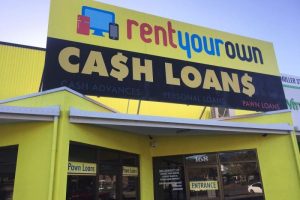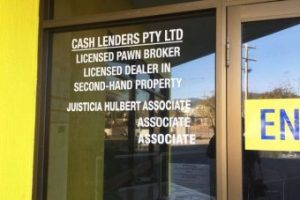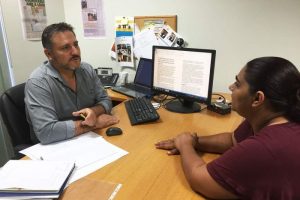 Re-posted with permission of the
Re-posted with permission of the
Australian Broadcasting Corporation
By Sharnie Kim
A former used car salesman who was fined $1.2 million for repeatedly signing up poor, Indigenous people in far north Queensland to exorbitant loans is continuing to work as a pawn broker in Cairns.
Colin Hulbert was slapped with a lifetime ban from engaging in credit activity by the Australian Securities and Investments Commission this week, but can continue to pawn lend legally, because it falls outside the scope of national credit legislation.
Mr Hulbert’s companies Channic Pty Ltd and Cash Brokers operated from his used car dealership Super Cheap Car Sales, and charged brokerage fees of up $990 to facilitate loans with an interest rate of 48 per cent for consumers to buy vehicles that were often in poor condition.
 He and his companies were fined $1.2 million including costs by the Federal Court last year for breaching responsible lending obligations and engaging in unconscionable conduct.
He and his companies were fined $1.2 million including costs by the Federal Court last year for breaching responsible lending obligations and engaging in unconscionable conduct.
The ABC understands Colin Hulbert has gone on to work as a pawn broker at his wife’s business, Cash Lenders, in Cairns.
He transferred ownership of the business to his wife in July last year, and ceased being a director in January this year.
Neon signs on the shopfront advertise cash advances, personal loans and pawn loans, but only “pawn loans” is lit up.
Jon O’Mally from the Indigenous Consumer Assistance Network (ICAN) said he first became aware of Mr Hulbert in 2009 when they had an influx of people seeking help, predominantly from the Aboriginal community of Yarrabah, south of Cairns.
“Our clients were really under severe hardship and stress from the harassment from Colin in trying to collect payments and also the threat of repossessing vehicles,” he said.
He said more than 100 people complained to ICAN about Mr Hulbert, including from Cairns, Innisfail and Cape York.
“Colin’s behaviour was repetitive. He didn’t learn from his mistakes,” Mr O’Malley said.
 “If we saw 100 people through our doors I couldn’t imagine how many more [were impacted].”
“If we saw 100 people through our doors I couldn’t imagine how many more [were impacted].”
ICAN reported the case to the Australian Securities and Investment Commission (ASIC), which took legal action against Mr Hulbert and his companies in the Federal Court.
One of the witnesses was Rhonda Brim, an unemployed mother-of-eight from Cairns, who bought a van from Mr Hulbert so she could get her sick, newborn son to and from hospital for ongoing medical treatment.
She saw one of his flyers at a shopping centre, and signed up to the 48 per cent interest loan for a $7,000 van which turned out to be a “lemon”.
“At that time I thought that was reasonable for someone who couldn’t get finance from a bigger dealership because I wasn’t working so I went to whoever I could to get a vehicle for my son,” she said.
But Ms Brim said it was an emotional experience, because the van kept breaking down and she could not afford the fortnightly $200 loan repayments.
Our daughter started playing sports and we couldn’t afford to put her into AFL at the start because we were paying for the car and then paying for taxis and buses to get to the hospital. It was really hard,” she said.
 Ms Brim said one day her father needed a lift to Kuranda because his brother had just died, but the van would not start, prompting her to seek help from ICAN and she eventually testified against Mr Hulbert.
Ms Brim said one day her father needed a lift to Kuranda because his brother had just died, but the van would not start, prompting her to seek help from ICAN and she eventually testified against Mr Hulbert.
‘It feels like everything was for nothing’
ASIC found Mr Hulbert knowingly contravened credit legislation at least 73 times between 2008 and 2012, and permanently banned him from engaging in credit activity after concluding he was likely to re-offend.
He avoided paying the $1.2 million fine and $47,699 in compensation to affected consumers after filing for bankruptcy earlier this year.
“ASIC has won the case, but we have people who were witnesses who put in a lot of effort to ensure Colin was accountable for his mistakes but were not duly compensated,” Mr O’Mally said.
“I think that’s the sad thing of it all, people are still feeling the impacts of Colin’s behaviour even after a successful litigation.”
Ms Brim said it was frustrating, and did not think Mr Hulbert should be allowed to continue operating as a pawn lender.
“I thought that was the point of taking him to court in the first place, besides getting him shut down,” she said.
“It feels like everything was for nothing.
“I have to drive past that place every day when I drop my kids off at school. It’s really, really frustrating to see that those doors are open everyday.”
ASIC said it would continue to monitor Mr Hulbert’s activities.
“If he breaches the banning order then ASIC will take appropriate action,” a spokesman said.
‘Colin is not a lone ranger’
Rhonda Brim said she now carefully reads contracts and was alert to “warning signs” from those advertising easy loans, but said disadvantaged people would still struggle to find fair deals.
“Either they can’t get loans or they’re too afraid to try because they’re afraid of being rejected,” she said.
“The small pawn brokers and the small car dealerships like Colin’s business was easier, and they … say if you’re a low-income earner we’ll take you, doesn’t matter if you have a bad credit rating.”
Mr O’Mally called for the scope of the banking Royal Commission to be broadened to look at “fringe lenders” who could have a detrimental impact on the community.
“This is common. Colin is not a lone ranger in the credit sector, particularly in small amount credit loans and finance,” he said.
“We’ve seen people have heart attacks, suffer more mental illness and unfortunately we’ve had a couple of people commit suicide.
“It’s a sad thing and unfortunately we’re looking at a $20 billion industry that is probably targeted mostly at vulnerable or low-income people.”
*****
This article is sourced and reprinted with permission of the Australian Broadcasting Corporation. View the original story (June 21, 2018) at: http://www.abc.net.au/news/2018-06-21/cairns-lender-colin-hulbert-indigenous-loans-fines-qld/9893290.